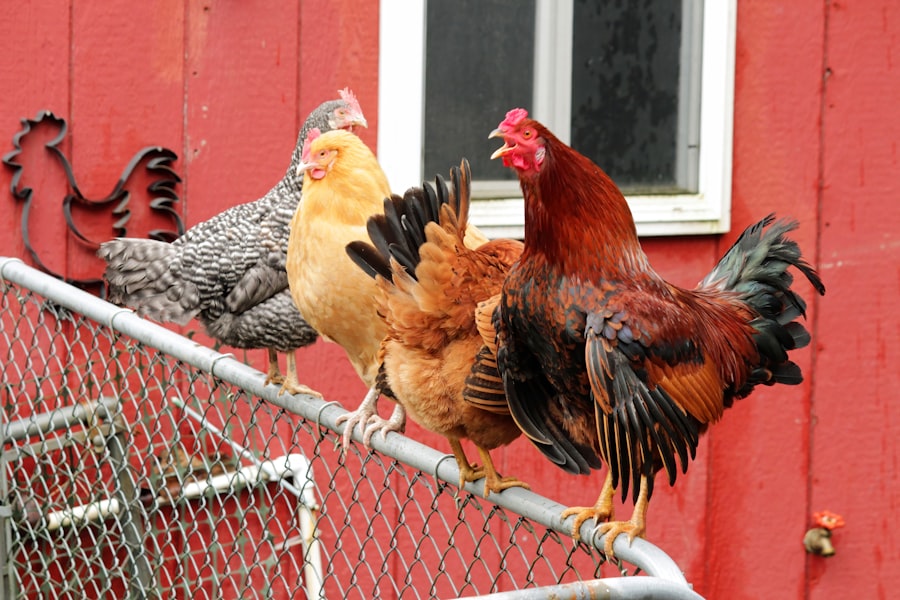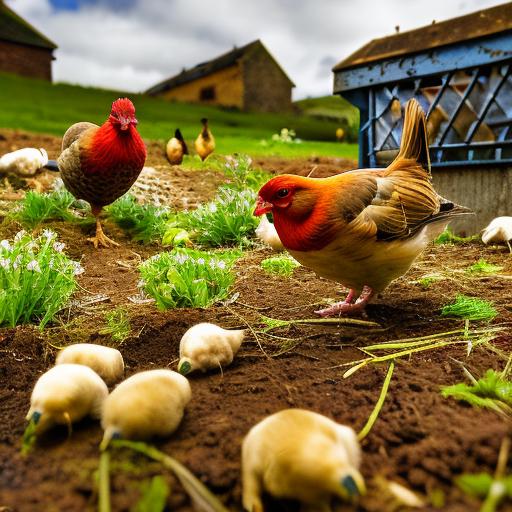Raising chickens in a council house may seem like an unusual idea, but it is becoming increasingly popular among urban dwellers. Not only does it provide a source of fresh eggs, but it also offers a fun and rewarding hobby. However, before embarking on this venture, it is important to understand the laws and regulations surrounding raising chickens in a council house to avoid any legal trouble.
Key Takeaways
- Understanding laws and regulations is crucial before raising chickens in a council house.
- Checking with the council is necessary to ensure compliance with local regulations.
- Choosing the right chicken breed is important for the climate and space available.
- Building an ideal chicken coop requires proper ventilation, insulation, and security.
- Maintaining a clean and hygienic coop is essential for the health of the chickens and the environment.
Understanding the Laws and Regulations
When it comes to raising chickens in a council house, there are specific laws and regulations that must be followed. These laws vary depending on the location, so it is crucial to research and understand the rules in your area. Failure to comply with these regulations can result in fines or even legal action.
Some common regulations include restrictions on the number of chickens allowed, the size and location of the chicken coop, and noise and odor control. It is important to familiarize yourself with these regulations to ensure that you are in compliance and can enjoy raising chickens without any issues.
Checking with the Council
Before starting to raise chickens in a council house, it is essential to check with the local council. They will have information regarding the specific regulations and requirements for keeping chickens in your area. Contacting the council can be done through phone or email, and they will be able to provide you with all the necessary information.
When contacting the council, it is important to ask questions such as:
– What are the specific regulations for keeping chickens in a council house?
– How many chickens am I allowed to keep?
– Are there any restrictions on the size or location of the chicken coop?
– What measures should I take to minimize noise and odor?
By checking with the council beforehand, you can ensure that you are following all the necessary guidelines and avoid any potential issues.
Choosing the Right Chicken Breed
Choosing the right chicken breed is crucial when raising chickens in a council house. Different breeds have different characteristics, such as egg-laying ability, temperament, and size. It is important to choose a breed that suits your needs and the available space.
Some popular chicken breeds for urban settings include the Rhode Island Red, Sussex, and Plymouth Rock. These breeds are known for their docile nature, good egg production, and adaptability to smaller spaces. However, it is important to research and choose a breed that fits your specific requirements.
Building the Ideal Chicken Coop
A good chicken coop is essential for raising chickens in a council house. It provides shelter, protection from predators, and a comfortable environment for the chickens. When building or buying a chicken coop, there are several features to consider.
Firstly, the coop should be well-insulated to provide warmth during colder months. It should also have proper ventilation to prevent moisture buildup and ensure good air circulation. Additionally, the coop should have nesting boxes for the chickens to lay their eggs and roosting bars for them to perch on.
The size of the coop will depend on the number of chickens you plan to keep. As a general rule of thumb, each chicken should have at least 4 square feet of space inside the coop and 10 square feet of outdoor space. It is important to provide enough space for the chickens to move around comfortably.
Maintaining a Clean and Hygienic Coop

Keeping the chicken coop clean and hygienic is crucial for the health and well-being of the chickens. Regular cleaning helps prevent the buildup of bacteria and parasites that can cause diseases. It also helps control odor and keeps the coop in good condition.
To clean the coop, start by removing any bedding or litter that has become soiled. Use a shovel or rake to scoop out any droppings or debris. Next, wash the surfaces with a mild detergent or disinfectant solution. Rinse thoroughly with water and allow it to dry before adding fresh bedding.
It is important to clean the coop regularly, ideally once a week or as needed. This will help maintain a healthy environment for the chickens and prevent any potential health issues.
Feeding and Watering Your Chickens
Proper feeding and watering are essential for the health and productivity of your chickens. A balanced diet ensures that they receive all the necessary nutrients for growth and egg production. It is important to provide a combination of commercial chicken feed, fresh fruits and vegetables, and access to forage.
Commercial chicken feed is readily available and formulated to meet the nutritional needs of chickens. It usually comes in pellet or crumble form and contains a balanced mix of protein, carbohydrates, vitamins, and minerals. Fresh fruits and vegetables can be offered as treats or supplements to provide additional nutrients.
In addition to food, chickens also need access to clean water at all times. Water should be provided in a clean container that is easily accessible to the chickens. It is important to check the water regularly and refill as needed.
Keeping Your Chickens Safe and Secure
Keeping your chickens safe from predators and other dangers is crucial when raising them in a council house. Predators such as foxes, raccoons, and birds of prey can pose a threat to your chickens. It is important to take measures to secure the chicken coop and protect your flock.
Start by ensuring that the chicken coop is securely built with strong fencing and locks. This will help prevent predators from gaining access to the coop. Additionally, consider installing an electric fence or using wire mesh buried underground to deter digging predators.
It is also important to be vigilant and check for any signs of predators in the area. Keep an eye out for tracks, droppings, or evidence of digging near the coop. If you suspect a predator is targeting your chickens, take immediate action to protect them.
Dealing with Noise and Smell Issues
Raising chickens in a council house can potentially cause noise and smell issues, which can be a concern for neighbors. To minimize these issues and be a good neighbor, there are several steps you can take.
Firstly, choose chicken breeds that are known for being quieter, such as Sussex or Plymouth Rock. These breeds tend to be less vocal compared to others. Additionally, keep the coop clean and well-maintained to minimize odor. Regularly clean out the coop and use appropriate bedding materials to absorb moisture and control smell.
It is also important to communicate with your neighbors and address any concerns they may have. Let them know about your plans to raise chickens and assure them that you are taking steps to minimize any potential issues. Being open and considerate can go a long way in maintaining good relationships with your neighbors.
Enjoying the Benefits of Raising Chickens in a Council House
Raising chickens in a council house offers numerous benefits that make it a worthwhile endeavor. Firstly, it provides a source of fresh eggs that are healthier and tastier compared to store-bought eggs. You have full control over the diet and living conditions of your chickens, ensuring that they produce high-quality eggs.
In addition to fresh eggs, raising chickens can also be a fun and rewarding hobby. It allows you to connect with nature, learn about animal husbandry, and experience the joy of caring for animals. It can also be a great educational opportunity for children, teaching them about responsibility and where their food comes from.
Raising chickens in a council house may require some research and planning, but it can be a rewarding experience. By following the laws and regulations, choosing the right breed, building a suitable coop, and maintaining good hygiene, you can enjoy the benefits of fresh eggs and a fun hobby. Remember to be considerate of your neighbors by minimizing noise and odor issues. So why not give it a try and enjoy the rewards of raising chickens in a council house?
If you’re wondering whether you can keep chickens in a council house in the UK, you might find this article on Poultry Wizard quite helpful. They provide valuable information on the topic, including tips on how to set up a chicken coop in your backyard. Additionally, Poultry Wizard offers a wide range of resources for poultry enthusiasts, such as articles on breeding turkeys during mating season. To learn more about keeping chickens and other poultry-related topics, visit Poultry Wizard.
FAQs
Can I keep chickens in a council house in the UK?
Yes, you can keep chickens in a council house in the UK, but you need to follow certain rules and regulations.
What are the rules and regulations for keeping chickens in a council house in the UK?
The rules and regulations for keeping chickens in a council house in the UK vary depending on the council. However, in general, you need to ensure that the chickens are kept in a suitable and secure coop, and that they do not cause a nuisance to your neighbours.
How many chickens can I keep in a council house in the UK?
The number of chickens you can keep in a council house in the UK depends on the council. Some councils have a limit on the number of chickens you can keep, while others do not. It is best to check with your local council for their specific rules and regulations.
Do I need permission from my council to keep chickens in a council house in the UK?
Yes, you need to get permission from your council to keep chickens in a council house in the UK. You can contact your local council to find out how to apply for permission.
What do I need to consider before keeping chickens in a council house in the UK?
Before keeping chickens in a council house in the UK, you need to consider the space you have available, the number of chickens you want to keep, and the time and effort required to care for them. You also need to ensure that you have a suitable and secure coop, and that you are able to keep the chickens in a way that does not cause a nuisance to your neighbours.
Meet Walter, the feathered-friend fanatic of Florida! Nestled in the sunshine state, Walter struts through life with his feathered companions, clucking his way to happiness. With a coop that’s fancier than a five-star hotel, he’s the Don Juan of the chicken world. When he’s not teaching his hens to do the cha-cha, you’ll find him in a heated debate with his prized rooster, Sir Clucks-a-Lot. Walter’s poultry passion is no yolk; he’s the sunny-side-up guy you never knew you needed in your flock of friends!







